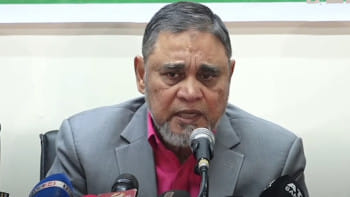Weighed down by too many subjects

Soon after the academic year began in January, Masuma Marjan tried to make a routine squeezing in all the 13 subjects she must complete before her JSC exams. But the eighth grader quickly realised she doesn't even have the whole year for her preparation -- her exams are scheduled for November.
So she has settled for studying the main subjects first, each carrying 100 marks, and then thumb through the “less-significant” subjects in whatever time she will have left.
Last year she couldn't even touch several chapters of two subjects because of time constraints. But the 14-year-old is more committed to studies this year as she prepares for her second public exams.
The National Education Policy 2010 promises a creative, favourable and joyful environment for primary and secondary students. This is probably why the education ministry introduced subjects like Arts and Craft, Physical Education and Health, Information and Communication Technology and Work and Life-oriented Education.
Each of these subjects carries 50 marks. If taught practically, these subjects could expand children's knowledge of real-life work and instil determination, enthusiasm and curiosity in them. But instead of going for such an approach, the curriculum designers have imposed on them page after page of theories to memorise.
Some of these subjects are not meant to be taught in the classrooms alone. Students should rather learn them through participation in practical lessons, and so the provision for any sort of tests on these subjects should be dropped, said eminent educationist Rasheda K Choudhury.
The subjects have been introduced in class six over the last few years, taking the total number of subjects to 13 from just six in class five.
For class nine and ten students, two additional subjects -- Work and Life-oriented Education and ICT -- were introduced in 2015, taking their total subjects to 14. So for the first time, SSC examinees took tests on 14 subjects this year.
These changes have been brought even as government high-ups, including the education minister, often speak about improving the standard of education and gradually take it to international level.
As Rasheda sees it there is no continuity and consistency in the curriculum.
As for the international standards, if the country's English-medium education is considered, studying 14 subjects in SSC level seems a daunting task.
English-medium students, who follow either Cambridge or Edexcel O-level curriculum, equivalent to SSC, have to pick at least five subjects, from more than 20 options, and pass them to be eligible to enroll in the next level. However, they can choose more than five subjects, depending on their learning ability and interest.
At SFX Green Herald International School in the capital for example, about 4-5 percent students take 12 subjects at O-level. While the school recommends that students take at least eight subjects, most students don't study more than nine, said Sister Gracie Gomes, senior section-in-charge.
But Bangla-medium students are overburdened with a huge pile of books, which is why they memorise answers from guidebooks instead of reading the textbooks thoroughly, teachers and guardians say.
Against such a backdrop, educationists last year recommended that the government drop a few subjects, among other things, to lighten up the burden on students, Education Minister Nurul Islam Nahid told a press briefing in November.
Excessive pressure drives away students' interest in studies, said renowned academic and author Prof Serajul Islam Choudhury.
According to him, education has become more exam- and result-centred with little focus on acquiring knowledge. Children fail to gain insights if they remain busy studying so many subjects.
TRAINING TO BE BOOK-SMART
The 2010 policy provides for extension of primary education up to class eight. But no step has yet been taken in that direction, which is why the education system remains faulty, said Rasheda, also a former caretaker government adviser.
In addition, before introducing a particular subject, the authorities hardly consider the facilities that should be in place.
Take the case of Mukta Khatun from Doyrampur village of Faridpur. Just days before her SSC exams that began last month, she didn't know what to do in the practical exam of ICT.
She didn't attend a single practical class of the subject in the last two years, since her Doyrampur Higher Secondary School has no power connection, let alone computers.
Her score in the subject will depend on her combined performance in written exam of 25 marks and 25 marks for practical. She has memorised certain answers and is relying on the written exam to pass.
The problem is not unique to Doyrampur school though, said Akram Hossain, who teaches ICT and three other subjects there.
He would arrange for viva exams for the students and send the marks to the education board.
Though this is how he seeks to solve the problem, Akram said, the main objective of incorporating the subject in the curriculum will not be achieved.
Regarding Physical Health, Masuma, studying in BAF Shaheen School in the capital, said she spent more time in her study room than doing something for real.
For example, the Physical Health textbook for class seven had 42 rules of cricket laid out, which she had difficulty remembering. She was never interested in cricket.
But unlike Mukta, she likes ICT. She had no chance of sitting before a computer in her school, but that was not an issue for her since she has a computer at home.
Another city student, 13-year-old Vaskor Srabon studying in class seven is fascinated with computer and internet. But subjects like Arts and Craft and Agriculture Study do not interest him. Also, he does not like drawing and painting.
Regarding Agriculture Study, he points out two chapters for class six focusing on how to prepare seedbeds, use of fertiliser and pesticides and how to control pest attacks and diseases of crops and vegetables.
Vaskor, of Udayan Higher Secondary School in Dhaka, had a tough time last year memorising so many numbers that farmers can easily get on the internet and in different software applications.
Yet he had to study all these subjects. “I struggle to find time … I can manage time for maximum nine subjects.”
Jubeda Khanom, who teaches Agriculture Study, Bangladesh and Global Studies and Life-oriented Education in different classes at Auronee, said that children's interest in these subjects declines as they climb to higher classes.
In class nine and ten, students consider them as an unnecessary burden, which they have to carry no matter how hard it is.
Jubeda especially points out the curriculum of Bangladesh and Global Studies for class nine and ten. The subject is designed as if to prepare the children for Bangladesh Civil Service exams, she said.
Weighed down by so many subjects, many students are losing interest in studies, said Durjoy Roy, an SSC examinee from Jessore Zila School.
A science student, Durjoy thinks ICT is a good incorporation. But subjects like Work and Life-oriented Education and Physical Education add to their already heavy burden.
“My son is bright. But I'm concerned that he may lose interest in studies under so much pressure,” said Mousumy Shill, mother of Vaskor.

 For all latest news, follow The Daily Star's Google News channel.
For all latest news, follow The Daily Star's Google News channel. 



Comments